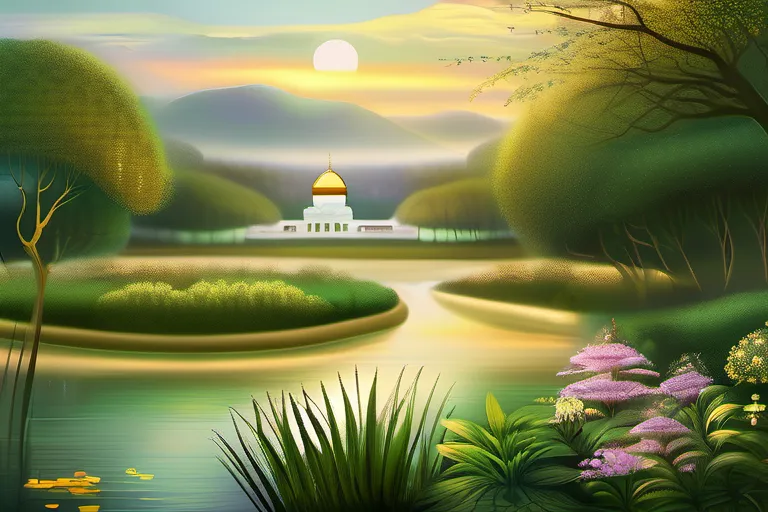Explore the beliefs, descriptions, and rewards of paradise according to Islamic teachings.
In this article, we delve into the profound concept of paradise as understood in Islam. We will explore its description, rewards, and the path towards attaining it. Prepare to embark on a journey through the spiritual realms of Islamic belief.
The Description of Paradise
Imagine stepping into a garden where every leaf whispers praises to Allah, and every flower blooms under the gentle touch of His mercy. In Islam, paradise (Jannah) is described as a place of unimaginable beauty, where the faithful find eternal rest and joy. But what does this paradise look like in the eyes of Islamic teachings?
Is it just a realm of physical pleasure? Or is there more to it than meets the eye? The description of paradise in Islam is both vivid and profound, blending physical splendor with spiritual enlightenment. Think of it as a grand palace where every detail—from the architecture to the furnishings—is crafted from purest materials, reflecting the divine craftsmanship of Allah.
Imagine walking through its lush gardens, where rivers of milk, honey, and pomegranate juice flow freely. These rivers are not just for drinking; they symbolize the abundance of blessings that overflow in paradise. Each drop is like a reminder of the infinite generosity of Allah, who has prepared such bountiful provisions for His loyal servants.
But this description goes beyond mere indulgence. The spiritual aspects of paradise are equally significant. In Jannah, there is no sorrow or pain; it’s a place where hearts find their true peace and souls experience the closest proximity to Allah. Here, believers wear garments of fine silk and fine linen, symbolizing the purity and righteousness that they upheld in this world.
Is paradise then a mere reward for good deeds? Or does it offer something far more profound—a constant reminder of the eternal love and mercy of Allah? As we explore these descriptions, we cannot help but wonder: how can such a place fail to satisfy the deepest desires of the human heart?
The description of paradise in Islam is indeed a journey from the earthly to the heavenly. It invites us to imagine a world where every moment is filled with joy, and every thought is guided by love. In this realm, believers find not just refuge but also an eternal home, a place where they can bask in the glory of Allah’s presence.
The Rewards of Paradise
The Rewards of Paradise: Delve into the various rewards and blessings that await the faithful in paradise.
Imagine, for a moment, entering a realm where every wish is granted and every desire fulfilled—a place of eternal bliss and joy. What kind of rewards does Islam promise to those who seek it? According to Islamic teachings, the rewards of paradise are not just physical pleasures but a holistic existence marked by spiritual perfection.
In this paradise, believers will find themselves in the shade of God’s mercy, a metaphor for the ultimate comfort and protection. Here, there is no longer any need for worries or fears. Instead, every moment is filled with joy, love, and harmony. The rewards are not limited to material gains; they extend to an eternal sense of peace and contentment.
One of the most cherished gifts in paradise is the rivers of milk, honey, and fruit that flow freely. These metaphors represent the endless abundance and richness of divine blessings, far beyond anything we can imagine on Earth. But the true treasures are not just these physical delights; they are the close companionship with God and the eternal fellowship with the righteous.
Think about it: In paradise, the faithful will experience unwavering happiness, free from the doubts and uncertainties that often plague our lives here. The rewards of paradise are not just for the afterlife but a reflection of the divine presence in every moment we strive to live our faith with sincerity and integrity.
The path to these rewards is a journey of good deeds, righteousness, and submission to God’s will. But once there, the faithful find themselves in a world where the rewards are not just deserved but are an expression of God’s boundless love and mercy. So, what will you do today to ensure your place among those who will enter this promised land?
The Path to Paradise
Imagine you are walking on a path, but this path isn’t just any path—it’s the path to paradise. In Islam, attaining paradise is not merely a destination; it’s also a journey marked by righteous deeds and good works. So, how does one navigate this path?
The journey towards paradise begins with intention. Just as you might choose your next step carefully when walking on a tightrope, Muslims are encouraged to approach each decision with niyyah, or sincere intent. This means every action should be guided by the desire to please Allah and seek His blessings.
But what exactly constitutes these righteous deeds? The path is broad, encompassing not just prayers and fasting but also charity, honesty, kindness, and justice. Think of it like a garden where each virtuous act is akin to planting a seed. Over time, with consistent effort, this garden flourishes into the lush paradise described in the Quran.
Every step on this path is important. For instance, performing Fajr (morning prayer) regularly or giving Zakat (charity) can be seen as milestones that bring one closer to their ultimate goal. However, it’s the small, seemingly insignificant acts—like showing kindness to a stranger—that often have the most profound impact on one’s spiritual journey.
The path to paradise is also about suhu, or self-reflection. Muslims are urged to frequently examine their actions and intentions, much like checking your compass to ensure you’re still heading in the right direction. This reflection helps in making necessary adjustments, ensuring that every step taken is towards greater piety and righteousness.
So, as you walk this path, consider it not just a journey to a place but a lifelong commitment to righteousness and goodness. After all, what more can one ask for than a path that leads to both salvation and spiritual fulfillment?
Paradise in Hadith and Quran
Imagine a place where every desire, every wish, and every hope come true—where comfort, beauty, and joy are infinite. In Islam, this utopian realm is known as Paradise (Jannah). But what exactly does the Hadith and Quran say about it? How do these holy texts describe the concept of paradise? Are we to visualize it as a literal garden filled with lush trees and flowing rivers, or is there more to its significance?
The Hadith and Quran are replete with descriptions that paint a vivid picture of Paradise. They often compare it to the bliss of heaven itself, where eternal life, perfect health, and endless abundance reign supreme. Think about it: if you could choose any place in this world as your final destination, what would it be like? The Hadith and Quran provide us with some tantalizing clues.
One of the most profound descriptions comes from the Hadith where the Prophet Muhammad (peace be upon him) is said to have seen Paradise. He described it as a place of perpetual youth, beauty, and joy. Imagine being young forever, having your physical needs met effortlessly, and enjoying the company of loved ones without any end. These descriptions are not just poetic; they convey the essence of what Muslims believe awaits them in Paradise.
The Quran also elaborates on the rewards of paradise. It speaks of maidservants as pure as pearls, rivers of milk, honey, wine, and water, and fruits that last for eternity. These descriptions are meant to inspire believers to strive towards righteousness and piety in this life, knowing that their efforts will be rewarded with the ultimate bliss.
The significance of these mentions cannot be overstated. They serve as a motivational tool, encouraging Muslims to lead virtuous lives, perform good deeds, and avoid sin. The concept of paradise acts as both a goal and a reward for adhering to Islamic teachings. It’s like having a lighthouse guiding a ship through turbulent seas; the beacon of Paradise shines brightly, urging us towards righteous paths.
So, what do these descriptions tell us about the nature of Paradise? Are they meant to be taken literally, or are there deeper meanings behind them? The beauty of Islamic teachings lies in their ability to blend profound spiritual truths with metaphysical symbolism. Whether one sees paradise as a physical place or a state of being, its significance remains clear: it represents the ultimate fulfillment and reward for those who seek closeness to Allah.
The Inhabitants of Paradise
Imagine paradise as a vast garden, where every leaf whispers tales of eternal peace and joy. In Islamic teachings, who will inhabit this serene realm? According to the Quran and Hadith, those who strive in the path of God are granted entry into Paradise. But what qualities must one possess to earn such a reward?
The inhabitants of paradise are not merely those who avoid sin; they are individuals who exemplify kindness, compassion, and righteousness. Think about it—how many times have we heard the story of Prophet Mohammed advising his companions that a small act of charity could outweigh a significant sin? The key is not just in avoiding evil but in actively doing good.
In the heart of Paradise, you will find those who were gentle and humble in their dealings with others. They treated people with respect, even when it was easier to be dismissive or rude. Could you imagine walking among such individuals, learning from their every interaction? The inhabitants of paradise are like mirrors reflecting the beauty of God’s attributes.
Consider also those who were patient and endured trials with faith. In this life, we face countless challenges; in Paradise, one’s patience is rewarded with a glimpse of the eternal bliss that awaits them. These individuals are not just seen but revered as role models for others to follow, embodying resilience and trust in God’s plan.
The inhabitants of paradise are also those who sought knowledge and understanding. They were eager learners, always seeking to deepen their comprehension of the universe and their place within it. Knowledge here is not just theoretical but practical, guiding them in making wise decisions that benefit both themselves and others.
Reflect on these qualities as you ponder your own life journey. Are you striving towards these virtues? The path to Paradise may seem long, but every step forward brings you closer to the eternal home awaiting those who walk with God’s guidance. Could it be that you too will find a place among the inhabitants of this glorious realm?
In the end, the description of paradise in Islam is not just about a physical place but a spiritual state of being. It symbolizes the ultimate fulfillment of human potential and the realization of God’s love and mercy.
The Architecture of Paradise
The Architecture of Paradise: Delve into the architectural wonders and beauty of paradise as described in Islamic teachings. Imagine walking through a city where every structure seems to whisper tales of eternal bliss, where every door opens to a symphony of joy, and every pathway leads to deeper understanding and peace. How would such a place be structured?
According to Islamic teachings, the architecture of paradise is not just about grand buildings but also about the essence of beauty, tranquility, and harmony. Can you picture it? Imagine vast gardens where rivers flow beneath trees laden with ripe fruit. These gardens are known as Jannah, a term that signifies more than just a physical place; it represents a realm of perfection.
The streets in paradise are lined with precious stones, their brilliance reflecting the light of God’s grace. The houses there are adorned with intricate patterns, each one telling stories of divine wisdom and mercy. But perhaps the most striking feature is the Nur, or divine light, that illuminates every corner of this celestial realm. This light, a metaphor for spiritual insight, ensures that those who dwell in paradise see clearly and understand deeply.
Wouldn’t it be fascinating to explore these descriptions further? Could you imagine how each architectural element serves not only as a physical wonder but also as a reflection of the spiritual journey towards perfection? In this world of endless beauty, every detail is designed to guide souls closer to God’s love and wisdom. How can such an environment fail to inspire awe and longing?
The architecture of paradise, then, becomes more than just buildings—it’s a map for the soul, leading us toward a state of eternal peace and happiness. As we journey through these descriptions, we are invited to envision not only what paradise might look like but also how our lives on Earth can reflect its values of beauty, tranquility, and divine connection.
Conclusion
 By understanding the beauty and promise of paradise, we are inspired to lead lives that align with the teachings of Islam. May this guide serve as a beacon of knowledge and motivation for your spiritual journey.
By understanding the beauty and promise of paradise, we are inspired to lead lives that align with the teachings of Islam. May this guide serve as a beacon of knowledge and motivation for your spiritual journey.











